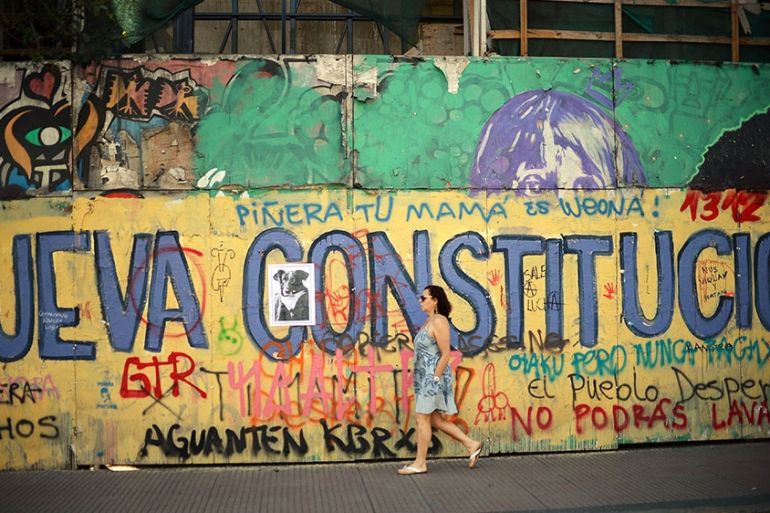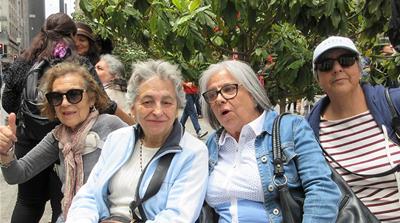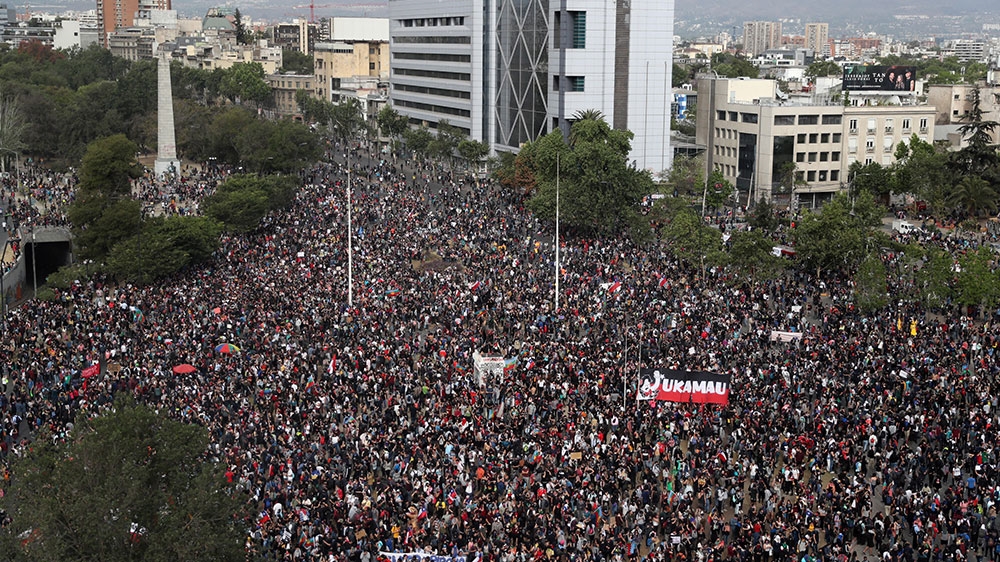Chile protests: Chileans demand new constitution amid unrest
Although it has undergone reforms over the decades, Chile’s constitution was written during the Pinochet dictatorship.

Santiago, Chile – Fleeing political persecution, 73-year-old Maria Eliana Ramirez left Chile in 1974, the year after General Augusto Pinochet took power in a US-backed coup.
Thousands of civilians were executed and forcibly disappeared during the 17-year dictatorship, which ended in 1990.
Keep reading
list of 3 itemsChile unrest: Pinera backs out of hosting APEC and COP25 summits
Chile protests: More than one million bring Santiago to a halt
Ramirez returned to Santiago eight years ago after living in Canada for more than 40 years, but seeing the military in the streets over the last two weeks has evoked memories of the killings and disappearances during the dictatorship, she said.

On Monday, Ramirez joined tens of thousands of other Chileans in the streets to take part in ongoing protests against growing inequality and calling for a new constitution.
“A new constitution is the number one thing,” she said.
Although it has undergone many reforms over the decades, Chile’s current constitution was written by a small commission during Pinochet’s rule. Protesters want a participatory constitutional assembly to draft a new constitution, laying the foundation for a state representative of all Chileans and their priorities.
“We have a constitution that was established during a dictatorship,” Cristina Paillal, an indigenous Mapuche activist and university engineering student, told Al Jazeera in central Santiago.
“It sets out our neoliberal economic model,” she said. “We have a government that is corporate.”
Recent polls in Chile show that support for a new constitution has risen to 80 percent. Chilean President Sebastian Pinera‘s approval rating has dropped below 15 percent, according to Cadem, a prominent polling and marketing company. Many are calling for his resignation.
“We are fed up, and we are united,” said Paillal, adjusting her bandana as tear gas fired by police wafted over the area.

‘This upheaval is necessary’
Student-led protests erupted in Santiago last month against a rise in subway fares, but they almost immediately broadened into nationwide daily demonstrations against rampant inequality and long-simmering collective grievances concerning health, education, pensions and other issues.
In response to protests and spates of property destruction and looting, Pinera initially said the country was at war with “a powerful and relentless enemy,” declaring a state of emergency. For more than a week, the military was deployed to various parts of the country, enforcing nighttime curfews and cracking down on protests.
At least 23 people have died in the unrest, including five killed by military and police forces, according to officials. More than 4,000 people have been detained and more than 1,600 wounded, according to the National Human Rights Institute.
The militarisation was what initially prompted Maria Eliana Ramirez to join protests, and she believes it was the catalyst for many.
“It infuriated me,” she told Al Jazeera. “The president said we were at war.”

The Chilean government ended the state of emergency last week and has announced a number of measures in an attempt to address the unrest. Pinera nixed the subway fare rise, proposed wage and pension reforms, replaced cabinet ministers and has repeatedly called for dialogue.
For protesters, however, the government response was too little, too late. Every day, social movement organisations and residents convene new actions and every day, police crackdowns continue.
Tens of thousands of protesters held their ground on Monday in the Plaza Italia, singing and chanting despite the occasional volley of tear gas canisters shot by police up a boulevard and into the crowd. Within two hours, though, police advanced with a water cannon truck and tear gas to evict the rally.
“This upheaval is necessary. The challenge now is how to channel it,” said Paillal.
“I do not think this is going to be over anytime soon,” she said.